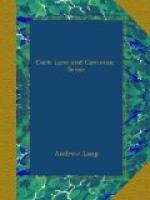Manifestly this is a point to be argued. Do the expenses of exorcism fall on landlord or tenant? This, we think, can hardly be decided by a quotation from Epictetus. Alexis Comnenus bids us seek a bishop in the case of psychical phenomena ([Greek]). So Maitre Chopin argues, but he evades the point. Is it not the business of the owner of the house to ‘whustle on his ain parten,’ to have his own bogie exorcised? Of course Piquet and Macquereau may argue that the bogie is Bolacre’s bogie, that it flitted to the house with Bolacre; but that is a question of fact and evidence.
Chopin concludes that a lease is only voidable in case of material defect, or nuisance, as of pestilential air, not in a case which, after all, is a mere vice d’esprit. Here Maitre Chopin sits down, with a wink at the court, and Nau pleads for the tenant. First, why abuse the judge at Tours? The lessors argued the case before him, and cannot blame him for credulity. The Romans, far from rejecting such ideas (as Chopin had maintained), used a ritual service for ejecting spooks, so Ovid testifies. Greek and Roman hauntings are cited from Pliny, Plutarch, Suetonius; in the last case (ghost of Caligula), the house had to be destroyed, like the house at Wolflee where the ghost, resenting Presbyterian exorcism, killed the Rev. Mr. Thomson of Southdean, father of the author of The Castle of Indolence. ’As to Plato, cited by my learned brother, Plato believed in hauntings, as we read in the Phaedo,’ Nau has him here. In brief, ’the defendants have let a house as habitable, well knowing the same to be infested by spirits’. The Fathers are then cited as witnesses for ghosts. The learned counsel’s argument about a vice d’esprit is a pitiable pun.
The decision of the court, unluckily, is not preserved by Le Loyer. The counsel for Bolacre told Le Loyer that the case was adjourned on the formal point, but, that, having obtained letters royal for his client, he succeeded in getting the remainder of the lease declared void. Comparing, however, Bouchel, s. v. Louage, in his Bibliotheque du droit Francois, one finds that the higher court reversed the decision of the judge at Tours. In the Edinburgh case, 1835, the tenant, Captain Molesworth, did not try to have his lease quashed, but he did tear up floors, pull down wainscots, and bore a hole into the next house, that of his landlord, Mr. Webster, in search of the cause of the noises. Mr. Webster, therefore, brought an action to restrain him from these experiments.
Le Loyer gives two cases of ghosts appearing to denounce murderers in criminal cases. He possessed the speech of the President Brisson (at that time an advocate), in which he cited the testimony of the spectre of Madame de Colommiers, mysteriously murdered in full day, with her children and their nurse. Her ghost appeared to her husband, when wide awake, and denounced her own cousins. As there was no other evidence, beyond the existence of motive, the accused were discharged. In another well-known case, before the Parlement de Bretagne, the ghost of a man who had mysteriously vanished, guided his brother to the spot where his wife and her paramour had buried him, after murdering him. Le Loyer does not give the date of this trial. The wife was strangled, and her body was burned.




